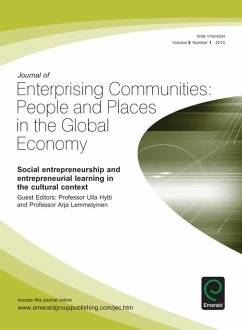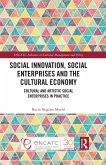As measured by all manner of indicators including dedicated journals, special issues, journal articles and editorials, entrepreneurship research has gained a strong foothold in business disciplines. The focus of interest moved from the person to the process toward the turn of the 21st century. At the same time, the research began to concentrate more on the role of the context in attempts to make sense of the process of becoming an entrepreneur, and of opportunity discovery and creation. Different cultural and social contexts clearly exert an influence. This special issue taps into and sheds light on these varying and sometimes unique contexts. Most of the theorizing at least implicitly assumes a formal economy. Nevertheless, small entrepreneurial businesses and ventures are part of the informal economy in many parts of the world, which Valery Gordin and Marya Dedova address in their paper (Social Entrepreneurship in the Informal Economy: a Case Study of Re-enactment Festivals). Similarly, the cultural and historical context may offer entrepreneurial opportunities, as in the above-mentioned research investigating re-enactment festivals as cultural events. Jennie Elfving contextualizes her study (Supporting the Cause - a Case Study on Social Entrepreneurial Identity at the Rosenlund Heritage Site) in one culturally and historically significant place. Mervi Raudsaar and Kaert Summatavet, in turn, investigate the cultural heritage of a region as a source of new ideas and ventures (Cultural Heritage and Entrepreneurship - Inspiration for Novel Ventures Creation). What unites these papers is the idea of a situated context in which entrepreneurship can develop. It is within such contexts that possibilities become opportunities, or new ventures acquire unique resources. Without an understanding of the context it may be difficult to identify the opportunities entrepreneurs endeavor to exploit: the idea of manufacturing swords, for example, could be considered outdated beyond the context of re-enactment festivals. Entrepreneurship has also been primarily understood as a process of creating economic value. Recently, however, this purpose has been extended to cover the creation of social value. Valery Gordin and Marya Dedova investigate social entrepreneurship in an informal economy, whereas Jennie Elfving probes the question of developing an identity as a social entrepreneur. Linked to the questions of who becomes an entrepreneur and how opportunities are discovered or created is the question of whether or not these processes can be taught and learned, and if they can, what role might formal education play. Inherent in entrepreneurship education are many aims and goals reflecting the varying levels, which could also be viewed as a path. Lenita Hietanen and Taina Jaervi in this issue discuss the path from basic to vocational education (Conceptualizing Entrepreneurial Learning in Basic and Vocational Education). To date, the focus has been on learners, but Marja-Leena Roenkkoe and Jaana Lepistoe extend this to include teachers, and their crucial role in delivering enterprise education (Finnish Student Teachers' Critical Conceptions of Entrepreneurial Education). Finally, a strong strand of research emphasizes the process, suggesting that entrepreneurs "e;learn as they go"e;. Such learning is a social rather than an individual process. Lenita Nieminen and Arja Lemmetyinen (A Value-Creating Framework for Enhancing Entrepreneurial Learning in Networks) discuss the network approach to entrepreneurial education.This special issue of the Journal of Enterprising Communities comprises papers presented at the Cultural Entrepreneurship Conference (CEC) held in Pori, Finland in December 2012, all of which offer novel contributions to the emerging debates outlined above.
Dieser Download kann aus rechtlichen Gründen nur mit Rechnungsadresse in A, B, BG, CY, CZ, D, DK, EW, E, FIN, F, GR, HR, H, IRL, I, LT, L, LR, M, NL, PL, P, R, S, SLO, SK ausgeliefert werden.









